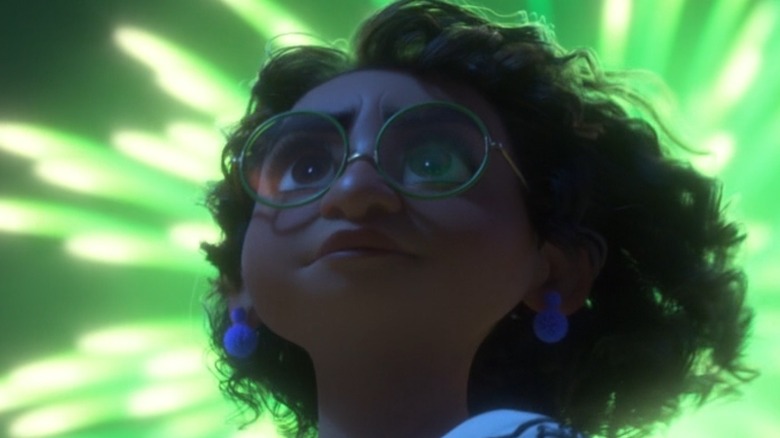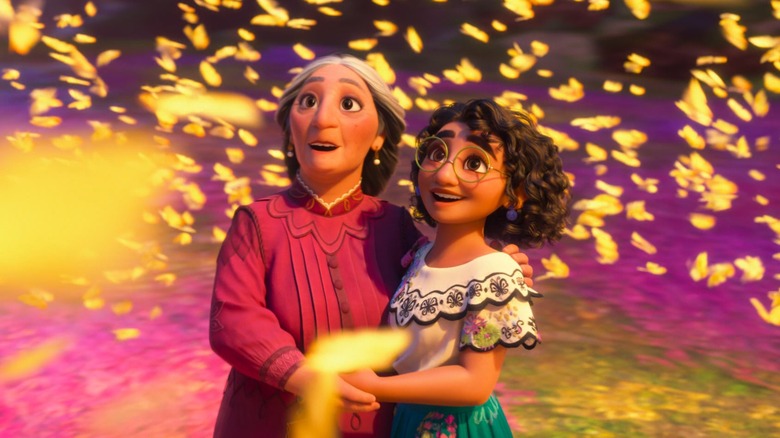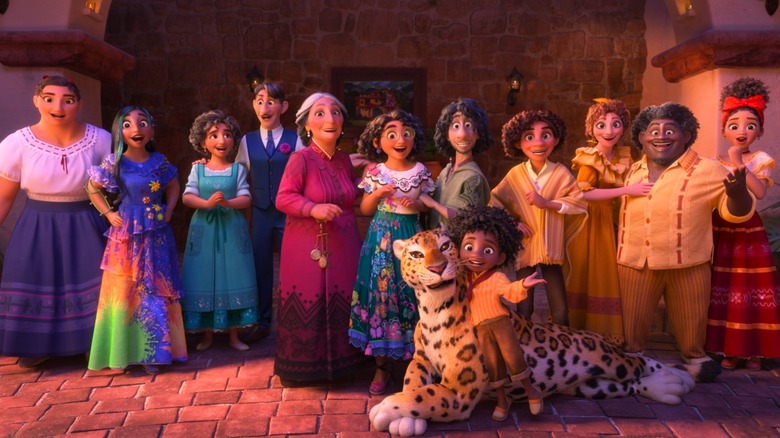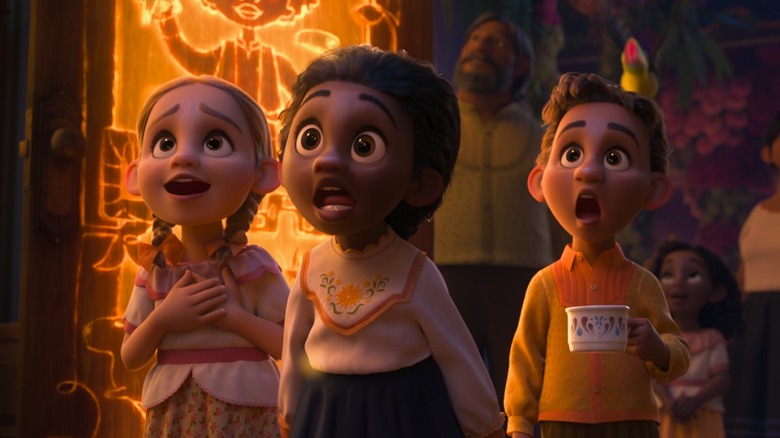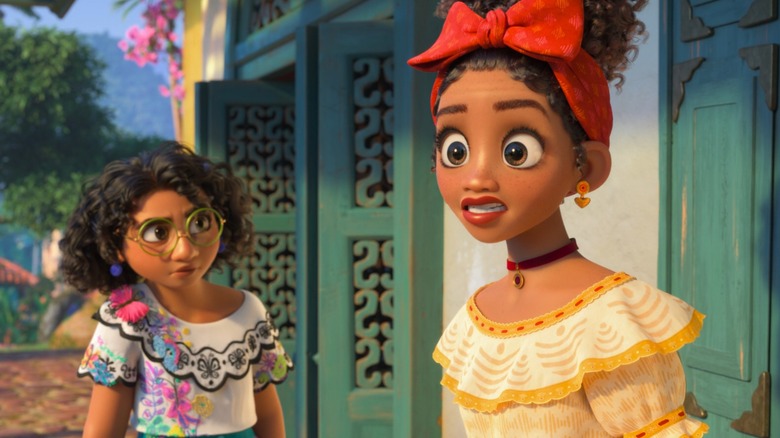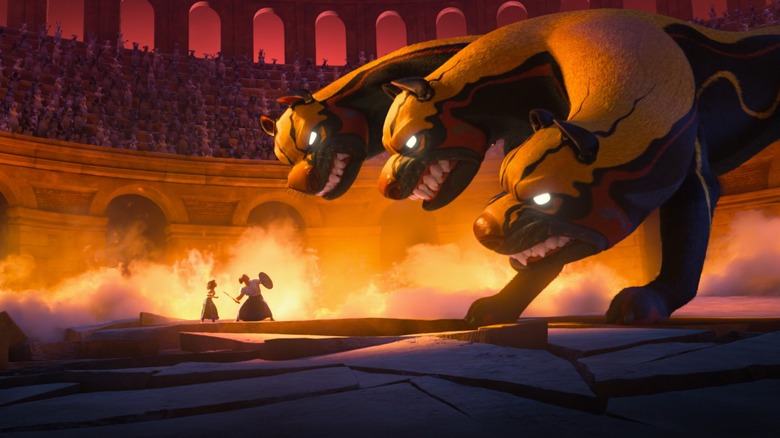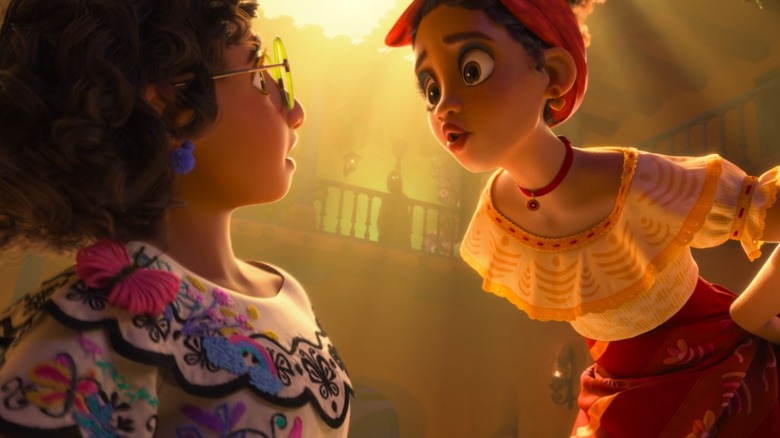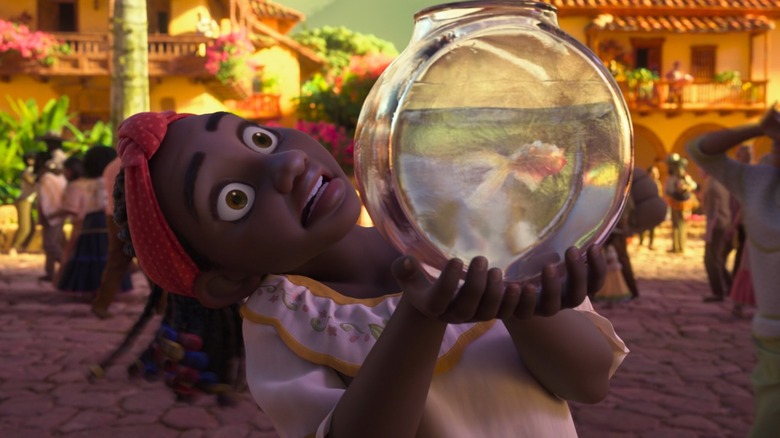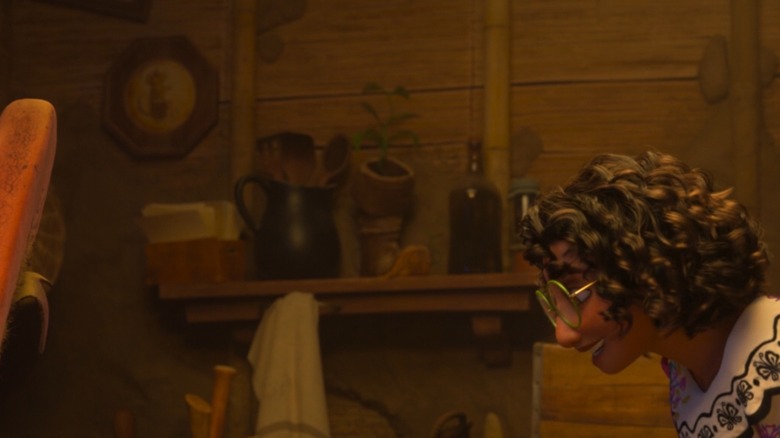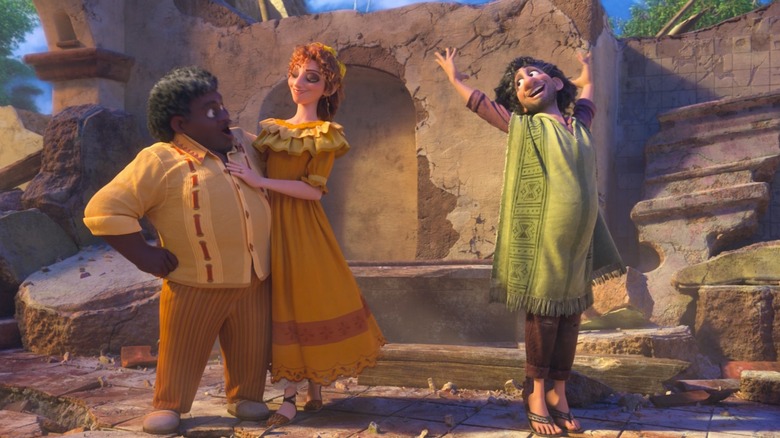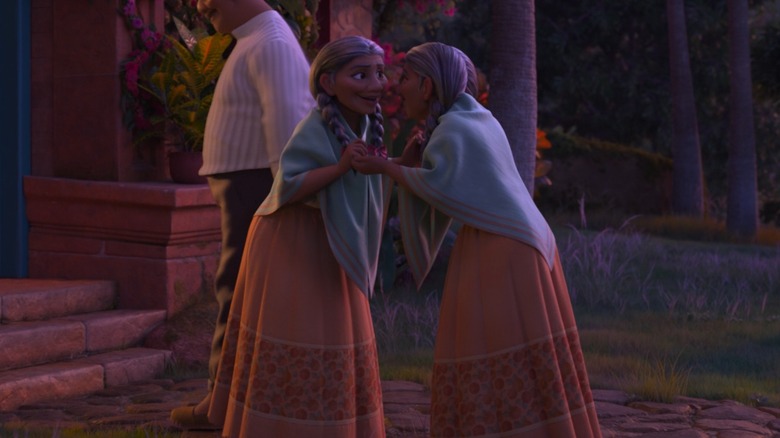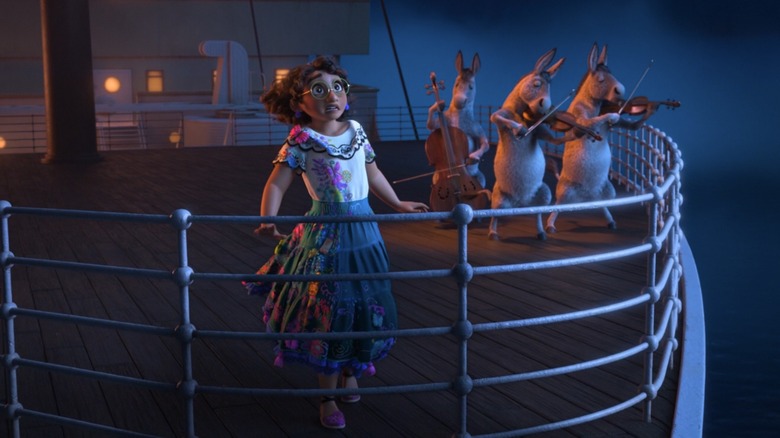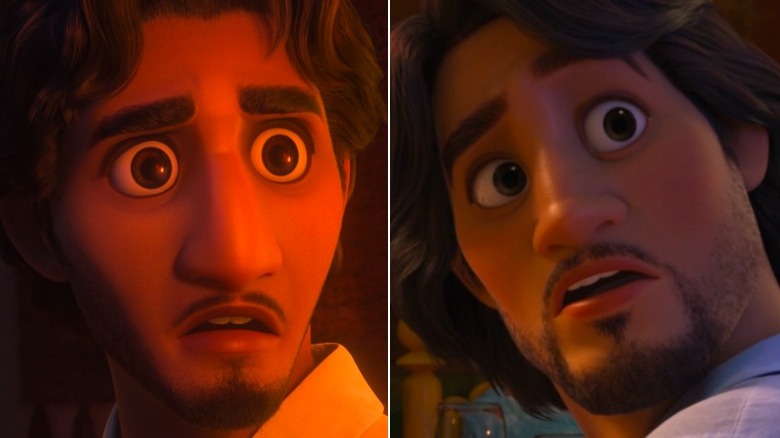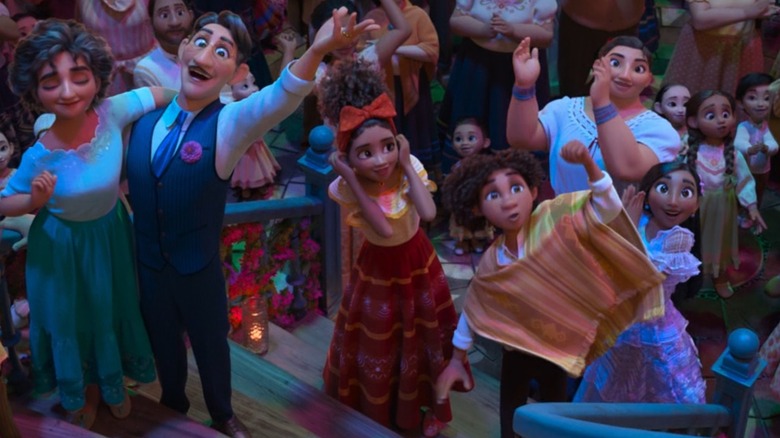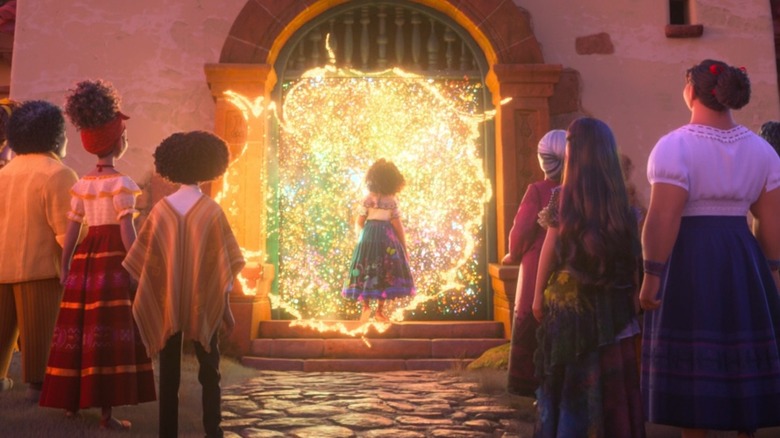Every Easter Egg You Missed In Encanto
Every Mom has the magical ability to conjure lost items at will, but literally mending broken bones with arepas con queso? That skill is reserved for a matriarch of The Madrigals, the familial centerpiece in the hit animated feature "Encanto". Unless you are an only child who has grown accustomed to clothes that fit and not having to share your Halloween candy, there is a character for everyone to connect with in "Encanto."
At first glance, "Encanto" appears to be a whimsical tale about a family of superhumans helping a village in the mountains thrive, but, under the surface, it has much more meaning. Hunting for Easter eggs has become somewhat of a pop-culture pastime and Disney is the undeniable master of hiding them — between the Marvel and Pixar universe, hunting them all down is a full-time job. See if you noticed all these Easter eggs hiding in "Encanto".
Spoilers abound!
Butterfly In The Sky
Each morning we unfurl ourselves from our blanket cocoons and attempt to fly through our day as gracefully as possible. Examining life through the metaphorical lens of the butterfly isn't a revolutionary concept, but "Encanto" was able to subtly weave nature's most tolerable insect throughout the film. The butterfly is symbolic of Mirabel and her place within her family. It is meant to represent metamorphosis and renewal.
The butterfly representation is sprinkled throughout the film and flutters across the screen at many pivotal moments in the story. During Mirabel's gifting ceremony (the one that didn't go so well), her outfit features an embroidery of butterfly-like patterns across the top frill. Her bedroom wallpaper is patterned on the delightful insect, as well as the broach she wears throughout most of the film. When Bruno is peering into the future in order to discover what Mirabel must do to save the miracle, you can see some butterflies dancing across the whirlwind that surrounds them. The climactic reconciliation that takes place between Abuela and Mirabel towards the end of the film is obviously drenched in a flurry of butterflies. Even more subtle though is a key piece of Abuela's outfit: the chain she wears on her waist features a clock and a key, fastened down with a butterfly.
Each of The Madrigal's outfits allude to their power
"Encanto" fills the screen with a vast amount of eye candy. It takes some focus just to keep up with all the nifty moves Casita is pulling in the background. A keen eye will spot some minutiae in the foreground though, particularly in the wardrobe department. Each family member's clothing choice references their unique ability. While some of these references are rather obvious, such as Isabella, who is constantly draped in flowers, others' are less apparent.
Mirabel's mother, Julieta (who has the ability to cook food that literally heals wounds), wears an outfit with a mortar and pestle on the front, as well images of a heart surrounded by herbs and spices. Luisa's dress references her super strength with images of dumbbells along the bottom. Camilo has the pattern of a lizard on his clothes, a nod to the chameleon and his shapeshifting abilities. Dolores' dress has sound waves across it, in reference to her superhuman hearing. Pepa's dress is covered in rain drops and heavily references sunshine, obviously meant to represent her ability to control the weather. Bruno has an hourglass on his poncho, to represent his power to see the future. Abuela's dress features the mountains where they reside and Antonio's vest is covered in animals. What about Mirabel? Well, her dress actually contains images that reference every ability in the entire family.
A Doctor Who reference
The magic contained inside The Madrigal household is difficult to quantify. From the outside, the family's house, known endearingly as Casita, seems modest enough. Once inside, however, the square footage appears to shoot off into a mystical realm where the rules of physics no longer exist. This is put on full display during Antonio's gifting ceremony, where his magical abilities are revealed and his new living quarters are unveiled. The glowing, golden bedroom door opens up into expansive jungle complete with its own existing ecosystem, which is immediately filled with animals from the surrounding area.
While everyone is gasping at the grandeur that is Antonio's bedroom, other children's jaws drop and one of them shouts, "It's bigger on the inside!?" The line is unassuming in and of itself, as the room is definitely worthy of exclamation. Those who have spent nearly 300 hours of their life following the adventures of "Doctor Who" may be uncontrollably smirking though. The line could be seen as an intentional nod to the Doctor's description of the TARDIS and its dimensional transcendence. The inside exists in a different dimension than its exterior, but more simply put by the Doctor themself, "It's bigger on the inside than it is on the outside."
Dolores knows more than she lets on
We all wear masks. And some of us are able to hide our true emotions behind those masks better than others. Of all the family members going about their tasks in the village, Dolores is most noticeable in her attempts to hide what she knows. She obviously knows the entire town's dirty little secrets. In fact, Dolores' face looks permanently fixed in an expression of somebody trying to play it cool, like they don't have juicy gossip to spill. Whenever she speaks, it's to drop nuggets of information. This has us thinking she knows much more than she lets on.
Some of the things Dolores says hint to her holding out additional information. When the family wishes to learn more of Mariano's thoughts, she simply perks up her ears, listens from across the village to the would-be suitor's private conversations, and tells Abuela what she wants to hear — very selectively, we might add. She most likely learned from Bruno's case, where everyone blamed it on the messenger. Speaking of Bruno, we are certain that Dolores knows of her missing Uncle's living situation for the past several years. Heck, she can hear Luisa's eye twitch! When Mirabel is seeking out information regarding Casita's injuries, Dolores mentions that the only other people talking about it are the rats in the walls. And in the song "We Don't Talk About Bruno," Dolores' states in her verse "I can always hear him sort of muttering and mumbling" — that would be the present tense she is using there, letting us know she is aware Bruno hasn't left the house.
Luisa references another Disney classic
One of the most memorable songs in "Encanto" is sung by the mighty Luisa. Every eldest child in the world had their heart strings exposed as she bellowed the woes of familial expectation. The song "Surface Pressure" has an incredible amount of information and reference packed into it. One of the lyrics that likely skated right past the younger audiences who aren't avid studiers of Greek mythology was her line referencing Hercules, "... under the surface, was Hercules ever like, 'Yo, I don't wanna fight Cerberus?"
The mythical creature she is referencing is a three-headed dog in Greek mythology that was said to guard the gates of the Underworld. Sometimes referred to as "The Hound of Hades", it was among the creatures conquered by the mighty Hercules. One of the most impressive aspects of Hercules' defeat of the creature was the fact that he didn't kill it, but he did assert his dominance and drag it into the land of the living. In the 1997 animated feature "Hercules," there is even a scene where Hercules bursts into Hades' throne room riding on the back of Cerberus in order to rescue his beloved Meg. It's a worthy inclusion to Luisa's song, showing an impressive amount of depth in the songwriting and letting us know it wasn't just a matter of rhythmic convenience.
Bruno is slinking around the background before his reveal
The song "We Don't Talk About Bruno" became one of the most unexpected musical sensations of the year. Many, however, might have missed a little background detail that is extremely obvious once you spot it.
During Dolores' verse in "We Don't Talk About Bruno", the man himself can be seen creeping across the top balcony behind Mirabel and her sister while they sing and dance. The first glimpse we catch of him skulking by isn't too obvious, but then the chorus continues "... grappling with prophecies they couldn't understand. Do you understand?" It is at this point that the screen zooms in on Dolores and Mirabel speaking the line, nose to nose. And there is Bruno. Smack dab in the center of the screen, with glowing green eyes, bobbing his head to the beat. How did we miss that the first time?
The clever character name that will make you smile
This is another delightful Easter egg is featured during "We Don't Talk About Bruno" tune. Specifically, it's a piece of behind-the-scenes information that creators provided us later. Just like most of the tunes in "Encanto", the smash hit involving the conversational exclusion of Bruno is packed with information. When the villagers are chiming in with their own tales of woe from the prophecies of Bruno, one woman exclaims, "He told me my fish would die. The next day, dead!"
This woman sings her one line and then dances off the screen to make way for other verses but her name is literally hilarious. "Encanto" creator Jared Bush shared on Twitter that coming up with clever character names is one of his favorite movie-making activities. The woman who sings the line about her fish is one such character. While it isn't mentioned in the movie, Bush revealed that this character's name is Senora Pezmuerto. Which translates to, simply, Mrs. Dead Fish.
A nod to Pixar's WALL-E
Spending several years residing in the walls of your family home is a difficult living arrangement but Bruno has gotten used to the ordeal, apparently. It has been a long time since he has had a visitor ... actually, we are going to assume he has never had a visitor. As such, his room hasn't been tidied up when Mirabel first steps in. This leaves a lot to be taken in, from the rat filled mini-theater to the haggard toothbrush serving as a rodent back scratcher. It's a room you can smell through the screen. Among all the debris is a recognizable item from "WALL-E."
Fans of Pixar know they are a fan of placing references to their other films in the background. It appears as though that tendency has leaked into other Disney features because while Mirabel and Bruno are discussing their next move, you can spot a boot with a plant sprouting out of it on the shelf behind them. Quite the specific greenery situation and undeniably a nod to the adorable trash-compacting robot, WALL-E.
Bruno is a fan of Frozen
The conclusion to "Encanto" comes in a rapid-fire musical number featuring every member of the family. And it all starts with Bruno expressing his love to his family. It's obvious that his sisters and the rest of his family have missed him dearly. Bruno takes the opportunity to express his apologies for his ominous prophecies and that he only meant to help. At one point in his melodious expression he gives an obvious nod to "Let It Go" from "Frozen".
Bruno zips over to his sister Pepa and elaborates on what he meant by the foreshadowing of her impending wedding day weather misfortune. He simply wants his sister to know that he loves her and does so by tossing debris in the air to simulate snow and bellowing in song, "Let it in, let it out! Let it rain, let it snow! Let it go!" It is a line that is expressed with such gusto we assume Bruno has watched "Frozen" nearly as much as parents have in the past decade ... and that's not including the stage productions acted out by his rat companions.
Shapeshifter Camilo greets a character from another Disney animation
Camilo could have done so much more mischief with the ability to shapeshift into any person. Instead, Camilo chooses to use his ability for the delight of others, shifting into familiar characters right in front of everyone, simply to elicit laughter.
Camilo's good nature is on full display during the town gathering for Antonio's gifting ceremony. The shapeshifter's duty lies in greeting villagers as they enter Casita. It's a fantastic display of psychological prowess because with the passing of each new guest, he morphs into the very person he is greeting. Imitation is said to be the highest form of flattery and Camilo is its grandmaster. Additionally, One of the guests entering the house looks suspiciously like a young Mama Coco from the animated feature "Coco". The hairstyle and outfit on the unnamed villager are pretty telling. And the youth of Ms. Maybe-Mama-Coco helps us gain a small sense of clarity in a Disney timeline that rarely has any discernible lineation.
The blink-and-you'll-miss-it Titanic reference
In addition to Luisa's nod to "Hercules," there is a reference to another titan of the past. We are referring to the prolific sea vessel known as the Titanic. While Luisa is professing her insecurities during "Surface Pressure", Mirabel finds herself standing on the deck of a gigantic boat. On the side of it is sprawled the family name, "Madrigal." The vessel is headed for a massive iceberg as Luisa sings the line, "The ship doesn't swerve, has it heard how big the iceberg is?"
The argument could be made that the Titanic isn't the first or only boat to strike an iceberg before, but it is the most famous. And what the back-up dancers/donkeys are doing in the background of this scene make the Titanic reference all the more certain. While Mirabel is standing at the ship's bow, for a brief moment, you can see the donkeys behind her with string instruments playing a slow tune as they head towards their demise. This is a nod to the musicians who played on the deck of the Titanic up until its final moments.
Isabella's would-be suitor, Mariano, looks suspiciously like another character from the family's past
Under the surface, "Encanto" is a tale of generational trauma. The pain of Abuela losing her husband is what caused the family miracle to blossom in the mountains. It saved them from impending doom and helped The Madrigals create a thriving village around Casita. The trauma of that event still lingers, though. Creators were sure to hint at this throughout the story told in "Encanto." A subtle detail included by animators has to do with the familiar face of Isabela's suitor, Mariano.
As the story unfolds, we learn that Isabela isn't exactly in love with Mariano. She is only moving through with the marriage because she believes it is what's best for the family. And in reality, it is what Abuela wants, who pushes the union pretty hard. Mariano's likeness to her deceased husband is probably a major factor in why she sees this match as a source of happiness for the family. It is another way in which the underlying psychological message of the film shines through.
Dolores has a lot to hear
The creators of "Encanto" put an incredible amount of effort into small details that make The Madrigal's reality all the more vivid. While it is basically a story about a family of superheroes, the whole experience feels relatable. Much of that feeling has to do with the characters and their individual experiences. And within each of those experiences, details about what life is like for each character helps expand the world we are viewing. Dolores is one such family member who has a lot more going on than anyone else even realizes. Her super-hearing must make the world a very loud place and small details let us know that is definitely the case.
Life with Dolores' ability would be a nightmare had The Madrigals settled in a metropolis. Luckily, they live in a small village in the mountains. It's still pretty loud, though. Next time you watch through "Encanto," watch closely how poor Dolores is going about her life in various scenes. She usually speaks in a soft, hushed voice. When there is any cause for clapping, she chooses to clap gently with her index fingers as opposed to the palms of her hands. In the scene where Antonio receives his gift, there are celebratory fireworks exploding off screen and while everyone else is cheering, you can spot Dolores getting startled and covering her ears.
Mirabel's unspoken abilities
After a healthy amount of hugs, a serious remodel on ol' Casita, and a well-deserved cocktail for Luisa, "Encanto" wraps up with a happy ending. But your closing thoughts may come with the same curiosities as in the film's opening song, "What about Mirabel?" The story reaches its conclusion with the mending of some generational trauma, individual growth, and new tile in the bathroom ... but Mirabel is still devoid of a magical ability. This seems unfair. But if you're peeved about her lack of a bedroom TARDIS or her inability to have an ability, then you may have missed the primary message of the movie.
Mirabel does have a gift, but it isn't as obvious as her family members. It lies in the metaphorical. Abuela has responded to the trauma of losing her husband, and the bestowment of the miracle that is Casita, by placing everyone's identity in the gifts they receive. It is a response to her pain and it has leaked through her family's generations, causing family members to feel that their value lies solely in what their gift can offer the community. Mirabel's ability lies in seeing her family members for who they are beyond their gifts. Not only is she gifted with her unique, loving viewpoint, but she is also the personification of the miracle itself. When Mirabel strengthens her relationship with Isabela, her sister discovers new abilities and the cracks in their home begin to heal. Then when Mirabel and Abuela fight, the gifts fade away and Casita crumbles to the ground. In the end, Mirabel does finally get her own door: the entrance to the entire Madrigal household.
